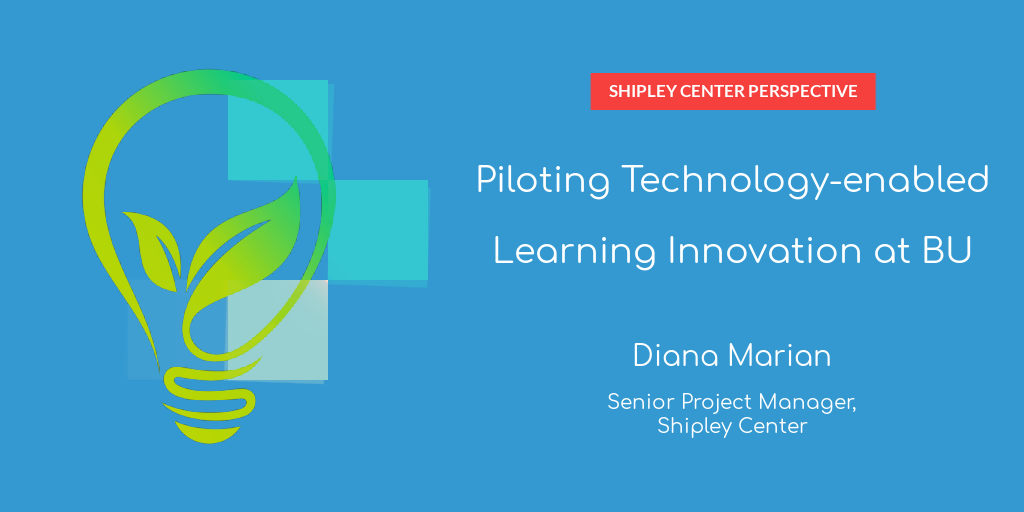Fostering Technology-enabled Learning Transformation at Boston University
By Diana Marian, Senior Project Manager, Shipley Center for Digital Learning & Innovation
Transformation in any field is rarely the result of a single experiment. Our team at Boston University’s Shipley Center for Digital Learning & Innovation understands that experimentation is a necessary precursor to innovation, which is why we pilot bold new ideas as we seek to leverage the potential of technology to positively transform learning. We partner with forward-thinking BU leadership, faculty, and staff to reimagine the educational experience offered to our students, then we test potential solutions, and we learn what works, what doesn’t, and why.
We are currently exploring experiments that focus on project-based teaching and learning, mentoring and advising, technology-enabled inclusive pedagogy initiatives and emerging educational technologies. We are interested in supporting ideas that might have a long-lasting transformative impact at BU and we’re always on the lookout for champions to collaborate with.

Needs, Goals, Vision
At the Shipley Center, we start any discussion of new ideas with a problem statement, goals, and vision. Why is a specific pilot needed? What challenge does it seek to address? What are the ideal experiences and goals it hopes to achieve?
Whether proposal authors wish to enable students to track their progress towards learning goals and specific skills, provide peer mentoring opportunities in the disciplines, or support student preparation for upper-level courses, we insist on this purposeful thinking because it gets to the core of why we bet on each experiment — to positively change how we deliver value to students now and in the long run, from the forefront of educational innovation.
“About the Shipley Center for Digital Learning & Innovation: DL&I’s Shipley Center supports Boston University faculty, departments, and schools with technology-enabled educational innovation in their residential courses and programs. We have a robust history of supporting experimental projects and emerging technologies, ranging from open online courses and innovations in project-based learning to lifelong learning portals and digital infrastructure for advising and mentoring. We are pleased to offer both funding and development support from project inception to pilot implementation and evaluation.”
Significance, Value, Opportunities
We seek to understand how an experiment might have significant and lasting positive impact for our students and BU at large. We look at any evidence of support for the proposed idea and we assess opportunities.
How might the envisioned goals be achieved with solutions available at BU, if at all? This step tends to be helpful especially at large institutions, where, try as they may, people may not have the bandwidth to always stay abreast of all the good things being done across various academic units. It helps us gauge if we might be creating redundancies or trying to reinvent the wheel, while gaining a better sense of the gap that an experiment could address.
We then seek to understand what novel approaches and technologies seem like potential solutions. We assess the feasibility of those options by looking at resource implications, timelines, and any specific elements that are indispensable for achieving the proposed goals. It is common for us to work with proposal authors on imagining the ideal experience and developing the feature requirements for the technology that will enable that. We then proceed to prioritize those requirements by categories such as nice-to-haves vs must-haves or phase one vs expansion. That process allows us to investigate potential technological solutions and, ultimately, to select one that best meets the needs we’ve identified. That’s what led us to support a pilot of Practera, an experiential learning platform, at the School of Public Health.
At times, we’ll receive a proposal that already includes the solution. In those cases, our intention is to understand what influenced it. When a team of Spanish instructors shared their enthusiasm about the Yellowdig platform after having explored that and other tools independently, we decided to support a pilot of Yellowdig for language learning aimed at fostering meaningful asynchronous interaction between students across various languages and multiple modalities. Letting needs and objectives drive the process of exploration keeps us honest to the experiment’s purpose, while leading with a solution in mind can confine the thinking process and potentially stifle innovation.
Success, Support, and Sustainability
We find that experiments are more likely to be feasible and to live past the pilot phase if their sustainability is considered early on. We encourage our collaborators to imagine and define what a successful experiment might look like, what evidence they might need to confirm that it achieved its objectives, and how it might scale beyond the pilot phase to other classrooms, units, departments and/or schools, either directly or through providing a compelling example for adoption.
This process involves considering success indicators and setting related targets, as well as being honest about any assumptions that are being made about key stakeholders, timelines, or any other elements of the pilot. A few years ago, we supported a pilot of a coaching app that relied on consistent participation and engagement with the technology; when both were low, it became clear that the experience would not scale. We deliberately start with a small experiment or a proof of concept, and it is essential that we understand its potential for scale.
We also find that sustainability planning is directly linked to leadership support from the participating academic unit. Does the appropriate Program Director, Dean, or Associate Provost endorse the idea and see its realistic implementation past a successful pilot? What evidence of success might they need in order to allocate resources toward its continuation?
Implementation, Evaluation, Debrief
The process described above is highly collaborative. The Shipley Center provides consultations before considering any funding and other implementation support. The proposals are co-developed in several iterations until they clearly convey the scope, significance, strategic value, support, and sustainability of the experiment — i.e., they meet our selection criteria. This approach allows us to address all the known elements while embarking on a journey of potential chaos that may or may not lead us to the specific goals envisioned initially, despite our best efforts.
We typically have hands-on involvement in the experiments we support throughout their implementation and we value collaboration, human-centered design, and adaptability. We check in with our collaborators regularly, discuss progress toward project objectives, and assess potential opportunities to pivot from our original plans. At the end of a pilot — or at prior major milestones — we debrief the experience to reiterate goals and to understand the extent to which they were achieved, to discuss success, challenges, and lessons learned, and to consider the next steps. Whether the experiments we support continue past the pilot stage or not, we see immense value in the journey and the exploration of how our institution’s value proposition can improve. If we manage to foster thoughtfully innovative investigation, implementation, and risk-taking in the pursuit of perpetually growing value for our students, each pilot is worthwhile.
Learn more about the Shipley Center, the Call for Proposals process, as well as ongoing and completed projects.
 About the Author: Diana was the Senior Project Manager for the Shipley Center for Digital Learning & Innovation at the time of publication.
About the Author: Diana was the Senior Project Manager for the Shipley Center for Digital Learning & Innovation at the time of publication.



